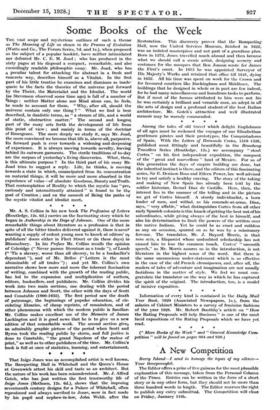Mr. A. S. Collins in his new book The Profession
of Letters (Routledge, 12s. 6d.) carries on the fascinating story which he began in Authorship in the Days of Johnson. One of the more remarkable things about literature as a profession is that in spite of all the bitter tirades delivered against it, there is never wanting a supply of ardent young men to knock at editors' or publishers' doors either in Fleet Street or (in these days) in Bloomsbury. In his Preface Mr. Collins recalls the opinion of Coleridge (" Never pursue literature as a trade "), of Lamb (" 'Tis a slavery, worse than all slavery, to be a bookseller's dependant "), and of Mr. Belloc (" Letters is the most abominable of all trades ") ; and yet Mr. Collins's own narrative shows how more and more the inherent fascination of writing, combined with the growth of the reading public, has led to the expansion and multiplication of authors, editors, booksellers, and publishers. Mr. Collins divides his work into two main sections, one dealing with the period between Johnson and Scott, the other with the days of Scott and Constable (1800-1832). The first period saw the death of patronage, the beginnings of popular education, of cir- culating libraries, of cheap reprints, of remainders, and of other phenomena with which the modern public is familiar. Mr. Collins makes excellent use of the Memoirs of James Lackington and it is good news that he is to give us a new edition of that remarkable work. The second section gives an admirably graphic picture of the period when Scott and Byron took the reading public by storm, and full justice is done to Constable, " the grand Napoleon of the realms of print," as well as to other publishers of the time. Mr. Collins's book is full at once of statistics, learning, and entertainment. * * ,*








































 Previous page
Previous page